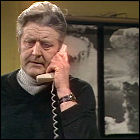 BBC1 airs the fifth episode of the science fiction series Doomwatch, created by former Doctor Who writers Kit Pedler and Gerry Davis. Davis writes this episode, but in a very rare occurrence, goes uncredited on screen.
BBC1 airs the fifth episode of the science fiction series Doomwatch, created by former Doctor Who writers Kit Pedler and Gerry Davis. Davis writes this episode, but in a very rare occurrence, goes uncredited on screen. 
 Tobias Wren and Dr. Stella Watson are informed by Spencer Quist that they’re suspended, effective immediately, moments after Quist receives a phone call from the Ministry. Suddenly out of work, Wren hits the bottle, as he is wont to do when the chips are down, and winds up confiding in the wrong person on the topic of Doomwatch. Dr. Watson also finds herself under scrutiny, to the point that she suspects her own boyfriend is spying on her. Furious, Quist descends upon the Ministry to demand explanations, discovering that the “preemptive firings” he’s been instructed to carry out are based on computer predictions of potential criminal behavior, rather than on past actions with any basis in fact.
Tobias Wren and Dr. Stella Watson are informed by Spencer Quist that they’re suspended, effective immediately, moments after Quist receives a phone call from the Ministry. Suddenly out of work, Wren hits the bottle, as he is wont to do when the chips are down, and winds up confiding in the wrong person on the topic of Doomwatch. Dr. Watson also finds herself under scrutiny, to the point that she suspects her own boyfriend is spying on her. Furious, Quist descends upon the Ministry to demand explanations, discovering that the “preemptive firings” he’s been instructed to carry out are based on computer predictions of potential criminal behavior, rather than on past actions with any basis in fact.
writer not credited
(written by Gerry Davis with additional dialogue by N.J. Crisp)
directed by Jonathan Alwyn
music by Max Harris
Cast: John Paul (Dr. Spencer Quist), Simon Oates (Dr. John Ridge), Robert Powell (Tobias Wren), Joby Blanshard (Colin Bradley), Wendy Hall (Pat Hunnisett), Nigel Stock (Keeping), Robert James (Barker), Hildegard Neil (Stella), Philip Brack (Jack), Erik Chitty (Old Man), John Linares (Young Man), Peter Hawkins (Computer Voice)
Notes: For a television show produced in 1970 (and likely written and filmed in late 1969), this episode does a remarkably good job of anticipating the “slow scan” loading of an interlaced JPG file at dialup internet speeds…even though neither JPG files nor the internet as we now know it were in existence at the time. Also
anticipated: the pieced-together-by-computer speech patterns of pre-recorded words and phenomes now commonly associated with “voice assistants” such as Siri (and even in early video game voice synthesizers like the Voice of Odyssey2). The writers of this episode are not credited on screen, a very rare occurrence. The story seems to have been inspired by elements of Philip K. Dick’s “Minority Report”, which was published in 1956.
LogBook entry by Earl Green